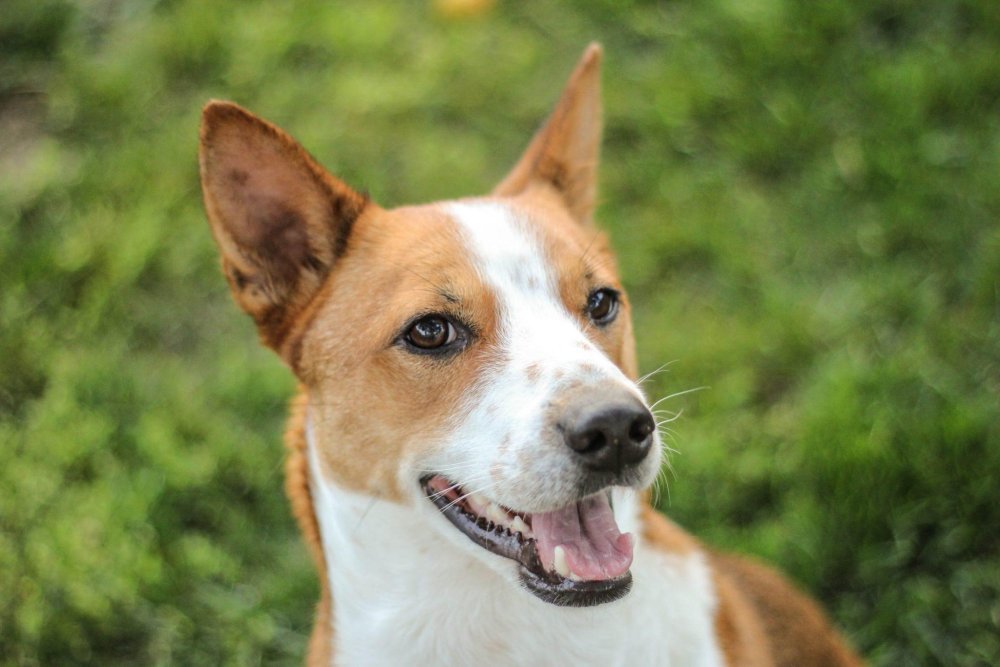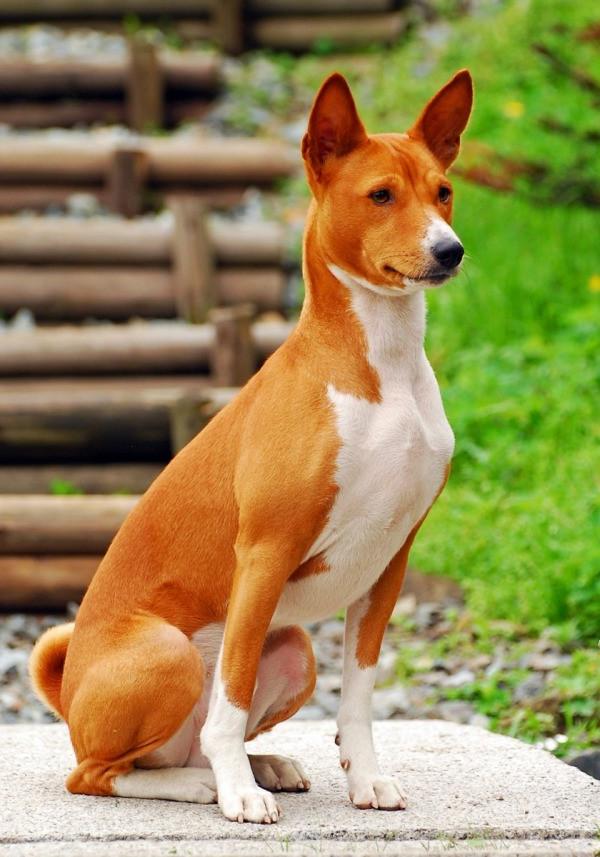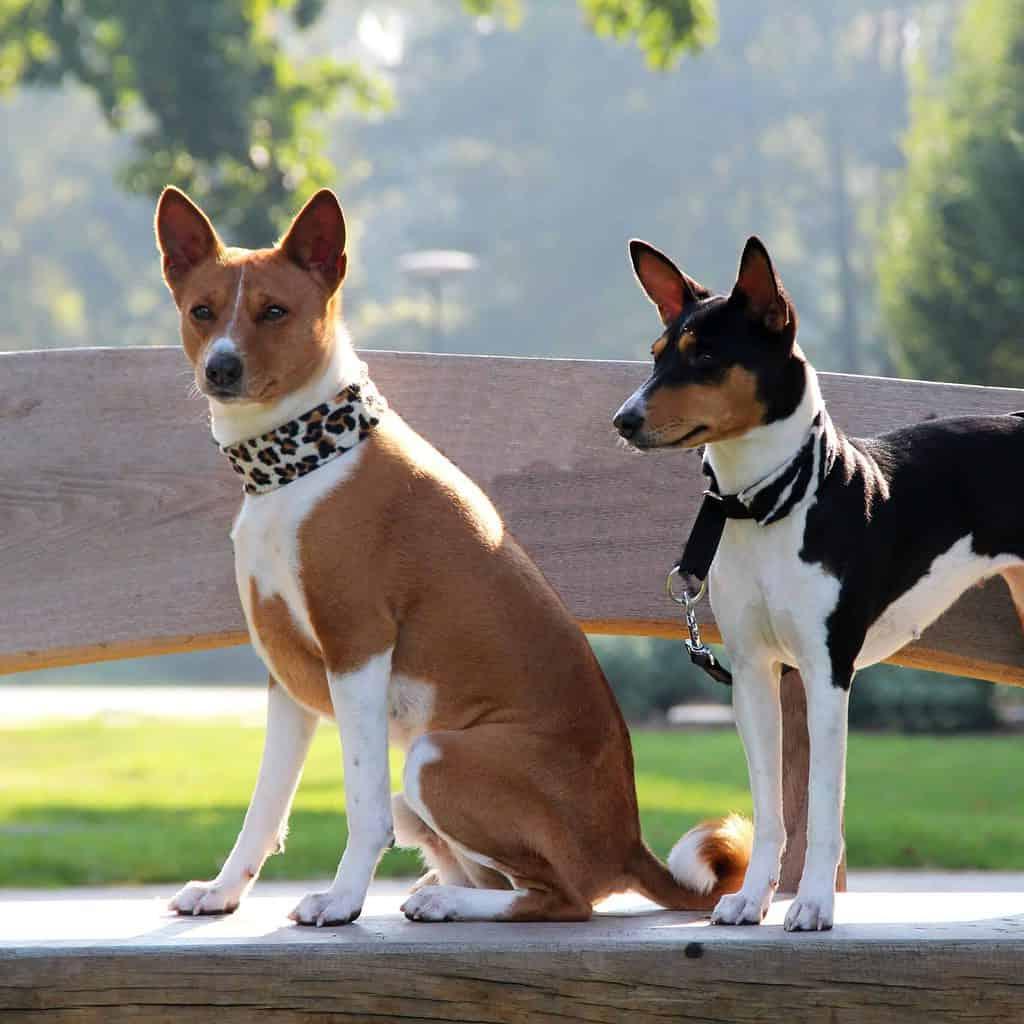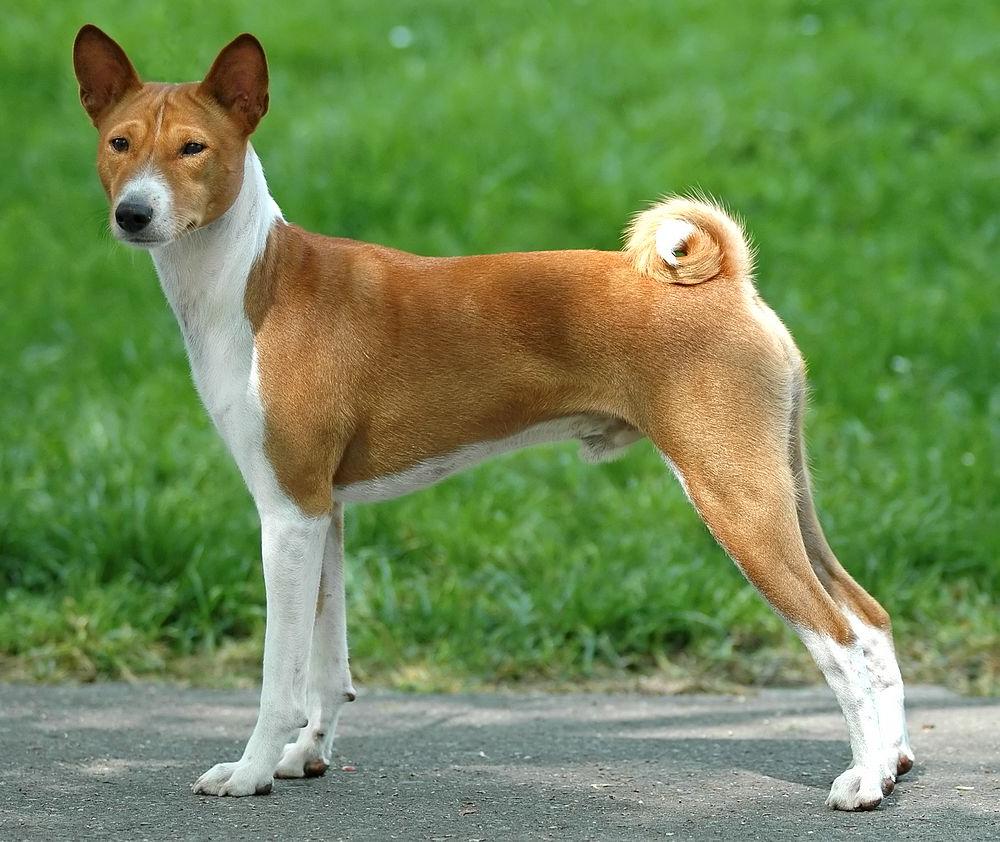- Breed Category: Hound
- Country of Origin: Democratic Republic of the Congo
- Average Height: Males 43 cm (17 in), Females 40 cm (16 in)
- Average Weight: Males 11 kg (24 lbs), Females 9.5 kg (21 lbs)
- Average Life Span: 12 to 14 years
- Grooming Requirements: Low, occasional brushing
- Exercise Requirements: High, needs daily exercise
- Coat Type: Short and fine
- Coat Color Variations: Red, black, tricolour, brindle
- Shedding Level: Low
- Ear Type: Erect
- Tail Type: Curled
- Temperament: Independent, alert, curious
- Intelligence Level: High
- Barking Tendency: Rarely barks, yodels instead
- Compatibility with Children: Good with older children
- Compatibility with Other Pets: Can be aloof with other dogs
- Training Ease: Moderate, requires patience
- Common Health Issues: Fanconi syndrome, hip dysplasia
- Dietary Needs: High-quality dog food recommended
- Energy Level: High
- Drooling Tendency: Low
- Sensitivity to Weather: Sensitive to cold
- Overall Maintenance Level: Moderate
- Original Purpose: Hunting and tracking
- Year of Recognition by Kennel Clubs: 1943
- Apartment Friendly: Yes, with sufficient exercise
- Best Suited For: Active families, experienced owners
- Cost of Ownership: Moderate to high
- Unique Traits: Does not bark, cleans itself
- Cultural Significance: Ancient breed, depicted in Egyptian art
- Popularity Rank: Moderate
Imagine a dog that doesn’t bark but yodels, with a sleek, muscular build and a coat that gleams in the sunlight. Meet the Basenji, a breed that’s as unique as it is ancient. Known for their intelligence and independence, Basenjis are often called the “barkless dogs” of Africa. This article aims to delve into the fascinating world of the Basenji, exploring their distinctive characteristics, rich history, and the care they require.
Originating from Central Africa, Basenjis were prized by hunters for their keen sight and speed. They’ve been depicted in ancient Egyptian art, highlighting their long-standing relationship with humans. Understanding their past helps us appreciate their present-day quirks and needs.
The Basenji: A Unique Canine Companion

Early Development of the Breed
The Basenji’s roots trace back to the heart of Africa, where they were developed as hunting dogs. Their keen senses and agility made them invaluable to local tribes. These dogs were not just hunters; they were partners in survival, adapting to the challenging environments of the African wilderness.
Role in African Hunting and Companionship
In African hunting expeditions, Basenjis played a crucial role. Their ability to silently track and corner prey without barking was a significant advantage. Beyond hunting, they were cherished companions, often living closely with families and forming strong bonds with their human counterparts.
Key Historical Figures and Events
Basenjis have been part of human history for thousands of years. They were depicted in ancient Egyptian art, suggesting their esteemed status. In the 20th century, efforts to bring Basenjis to the Western world began, with significant contributions from breeders who recognised their unique qualities.
Physical Characteristics
Basenjis are small but sturdy, with a sleek, muscular build. Their short coat comes in various colours, often with distinctive white markings. One of their most notable features is their tightly curled tail, adding to their elegant appearance. Despite their size, they exude a sense of grace and agility.
Appearance and Unique Traits
Basenjis are compact and athletic, standing about 40 to 43 centimetres tall and weighing between 9 to 11 kilograms. Their short, fine coat can be red, black, tricolour, or brindle, often accented with striking white markings on the chest, feet, and tail tip. This breed is instantly recognisable by its tightly curled tail, which sits high and proud over their back.
One of the most intriguing aspects of the Basenji is their lack of barking. Instead, they produce a unique sound known as a “barroo” or yodel, which is both charming and distinctive. This trait, combined with their expressive almond-shaped eyes and wrinkled forehead, gives them an alert and intelligent appearance.
Temperament and Behaviour
Basenjis are known for their independent and curious nature. They are intelligent and can be quite mischievous, often finding creative ways to entertain themselves. While they are affectionate with their families, they can be reserved with strangers, making early socialisation important.
These dogs thrive on activity and mental stimulation, so they need regular exercise and engaging activities to keep them happy. Their hunting instincts are still strong, so a secure yard is essential to prevent any unexpected adventures.
Personality and Suitability as a Family Pet

Typical Personality Traits
Basenjis are a fascinating mix of independence and intelligence. They’re not the type to follow commands blindly; instead, they like to think for themselves. This makes them both intriguing and sometimes challenging companions. Their energy levels are high, so they’re always up for an adventure or a game.
Suitability as a Family Pet
As family pets, Basenjis can be wonderful companions. They form strong bonds with their human families and are known for their loyalty. However, their independent streak means they might not be the best fit for everyone. They thrive in homes where they can be part of the action and have plenty of mental and physical stimulation.
Interaction with Children and Other Animals
Basenjis can be good with children, especially if they’re raised together. They’re playful and enjoy interactive games. However, their independent nature means they might not always be patient with very young kids. With other animals, early socialisation is key. They have a strong prey drive, so introductions should be managed carefully.
Training and Exercise Needs
Training a Basenji requires patience and creativity. They’re smart but can be stubborn, so positive reinforcement works best. Consistent training sessions that are fun and engaging will yield the best results. Exercise is crucial for this breed. They need daily walks and playtime to burn off their energy and keep them content.
Training, Exercise, and Health of the Basenji

Importance of Early Training and Socialisation
Getting a Basenji off to a good start with early training and socialisation is crucial. These dogs are naturally independent and curious, so introducing them to various environments, people, and other animals early on helps them grow into well-rounded adults. It’s all about setting the stage for a confident and adaptable companion.
Recommended Training Techniques
When it comes to training, Basenjis respond best to positive reinforcement. Think treats, praise, and playtime. They’re smart but can be a bit stubborn, so keeping training sessions short and fun is key. Consistency is your friend here, and mixing up activities keeps them engaged and eager to learn.
Daily Exercise Requirements and Activities They Enjoy
Basenjis are energetic and need daily exercise to stay happy and healthy. A good mix of walks, playtime, and mental challenges like puzzle toys will do wonders. They love activities that let them use their natural agility and speed, so consider games like fetch or agility courses to keep them entertained.
Health and Lifespan
Basenjis are generally healthy dogs with a lifespan of around 12 to 14 years. Regular vet check-ups and a balanced diet are essential to keep them in top shape. Like any breed, they can be prone to certain genetic conditions, so it’s wise to be informed and proactive about their health needs.
Health and Care for Your Basenji
Common Health Issues
Basenjis are generally healthy, but like all breeds, they’re prone to certain health issues. Fanconi syndrome, a kidney disorder, is one to watch out for. Progressive retinal atrophy, which affects vision, is another concern. Regular vet visits can help catch these early.
Average Lifespan and Health Tips
With proper care, Basenjis can live between 12 to 14 years. Keeping them healthy involves a balanced diet, regular exercise, and mental stimulation. They love to run, so a secure yard or regular trips to a dog park are ideal.
Preventative Care Recommendations
Preventative care is key. Regular vet check-ups, vaccinations, and dental care are essential. Consider genetic testing for common breed-specific issues. A healthy diet and weight management also play a crucial role in their overall well-being.
Grooming and Maintenance
Basenjis are low-maintenance when it comes to grooming. Their short coat requires minimal brushing, just enough to remove loose hair. They’re known for being clean dogs, often grooming themselves like cats. Regular nail trims and ear checks will keep them looking and feeling their best.
Coat Care and Grooming for Your Basenji

Coat Care and Grooming Routines
Basenjis are known for their sleek, short coats that are surprisingly low-maintenance. A quick brush once a week is usually enough to keep their coat looking its best. This not only helps remove loose hair but also keeps their skin healthy by distributing natural oils. Basenjis are quite cat-like in their grooming habits, often keeping themselves clean, which is a bonus for busy owners.
Shedding and Seasonal Grooming Tips
While Basenjis don’t shed heavily, you might notice a slight increase in shedding during seasonal changes. During these times, a bit more frequent brushing can help manage any extra hair. It’s also a good opportunity to check for any skin issues or parasites, ensuring your Basenji stays comfortable and healthy.
Diet and Nutrition
A balanced diet is crucial for maintaining your Basenji’s health and vitality. High-quality dog food that meets their nutritional needs is essential. Look for options rich in protein and healthy fats to support their active lifestyle. Fresh water should always be available, and treats should be given in moderation to prevent weight gain. Regular vet consultations can help tailor a diet plan that suits your Basenji’s specific needs.
Nutritional Needs and Feeding for Your Basenji
Nutritional Needs for Optimal Health
Feeding your Basenji a balanced diet is key to their health and happiness. They thrive on high-quality dog food rich in protein and healthy fats. Look for options that list meat as the first ingredient, ensuring they get the nutrients needed for their active lifestyle. Omega-3 and Omega-6 fatty acids are also beneficial for their skin and coat.
Foods to Include and Avoid
Include lean meats, fish, and vegetables in their diet. Avoid foods high in fillers like corn and soy, as well as artificial additives. Chocolate, grapes, and onions are toxic to dogs and should be kept out of reach.
Feeding Schedules and Portion Recommendations
Basenjis do well with two meals a day. Portion sizes depend on their age, weight, and activity level, so consult your vet for personalised advice. Keep an eye on their weight to avoid obesity, which can lead to health issues.
Fun Facts and Trivia
Did you know Basenjis are known as the “barkless dogs”? Instead of barking, they make a unique yodel-like sound called a “barroo.” This trait, along with their cat-like grooming habits, makes them truly one-of-a-kind companions.
Famous Basenjis in Media and History

Basenjis in Popular Culture
Basenjis have made their mark in the world of media and entertainment. One of the most famous Basenjis is “Bongo,” who starred in the 1956 film “Good-bye, My Lady.” This film showcased the breed’s unique traits and helped introduce them to a wider audience. The Basenji’s distinctive yodel and independent nature were highlighted, capturing the hearts of many viewers.
Historical Significance
Beyond the silver screen, Basenjis have a rich history that dates back thousands of years. They were often depicted in ancient Egyptian art, suggesting their esteemed status among the pharaohs. These dogs were not just pets; they were considered symbols of grace and agility, often accompanying royalty on hunting expeditions.
Modern-Day Recognition
Today, Basenjis continue to be celebrated for their unique characteristics. They have a dedicated following among dog enthusiasts who appreciate their intelligence and charm. Whether in historical texts or modern media, the Basenji’s legacy as a remarkable breed endures.
Final Thoughts

The Basenji is a truly unique and captivating breed. With their ancient roots and distinctive traits, they offer a blend of independence and loyalty that appeals to many dog enthusiasts. While they present certain challenges, such as their high energy and independent nature, the rewards of owning a Basenji are equally significant, offering companionship that is both engaging and affectionate. Embracing their quirks and understanding their needs can lead to a fulfilling relationship with this remarkable breed. For those ready to embark on this journey, the Basenji promises a lifetime of adventure and companionship.
